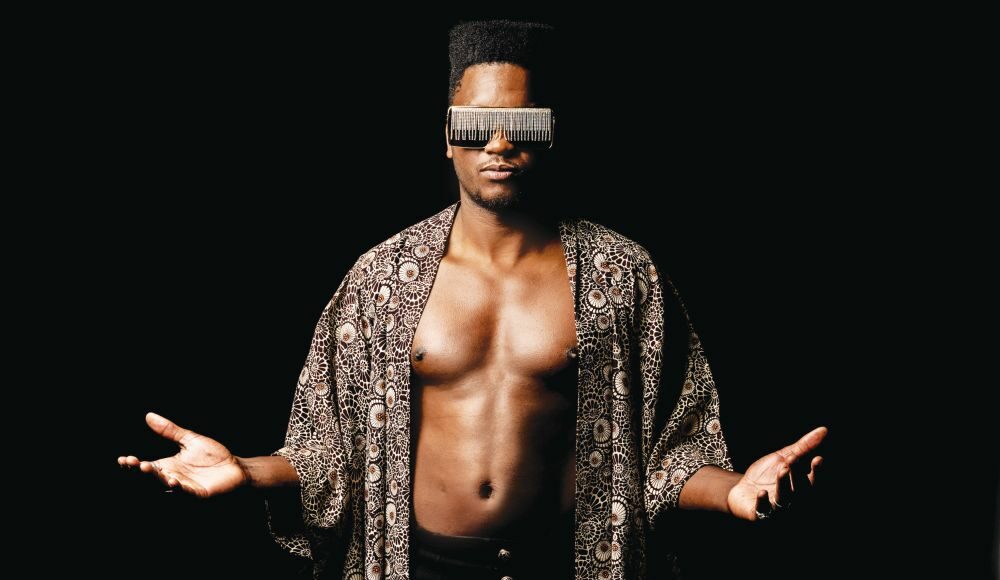Cimafunk never got to break the news of his Grammy nomination to his family. They all found out before he could tell them.
“I was meeting at the airport with my manager,” Cima says. “I was in the plane, and then news arrived. When I arrived in Korea, everybody knew. My mom, everybody. All my teammates knew. I couldn’t give the surprise to nobody.”
There are worse problems to have. In just a few short years, Cimafunk had risen from an unknown name in the Havana scene to an international star—a status further propelled by his nomination for Best Latin Rock or Alternative Album.
This Saturday, Cima and his band (collectively, Cimafunk) play the main stage for San Jose Jazz’s Summerfest. But before he was Cimafunk, Erik Alejandro Iglesias Rodríguez was following in a long line of family members and attending medical school. It had been a family calling, a path walked by his grandmother, mother and uncle. But no matter how hard he tried, it never felt like his own calling. Two years in, he decided to switch to something that he had always been passionate about instead. Music. His family was entirely supportive.
“Everybody just loved the way I was into music since I was a kid,” he says.
He adds one crucial additional point: “And nobody wanted to have a bad doctor in the family.”
Relocated to the capital, Cima began to play in cover bands. His group Los Boys packed Havana clubs with fans and dancers up until the moment Cima decided he wanted to go it alone. He took some time off for himself in the countryside, where he began to write some of his own songs on an acoustic guitar. When he got back from a stint in the country, instead of playing covers, he was ready to record his own music.
Cima bought about $150 worth of equipment and set about recording his debut. The result was the first Cimafunk album, Terapia.
“It was super organic, because I didn’t know about how to produce music, but I knew that I wanted to make my own music,” Cima says.
Despite its big, club-ready sound, the album was largely recorded in a bedroom where Cima set up a table, his laptop and two little speakers. The album’s vocals were recorded on a $70 MXL mic.
Despite its humble origins, Terapia won Cimafunk much acclaim—along with the attention of some industry insiders.
For his second album, Cima worked remotely with producer Jack Splash, whose previous credits include work with Alicia Keys, Kendrick Lamar and Solange Knowles (“he’s a really funky producer,” Cima says). The process this time around was “much different.” Songs began with loose grooves suggested by Splash, over which Cima would sketch verses which he’d send back to his producer. From there, came layers of synths and horns, and a deepened groove. Cima would then send it to a friend in Cuba for congas and other instruments.
Back when he started, Cima saw his first album as a therapeutic release, the outpouring of music welling inside of him. Thus, its title: Terapia (therapy). However, after touring and promoting the 2017 album hard for years, he had begun to feel drained. But once he began working with his new producer on the follow-up record, he found the process incredibly nourishing. Immediately, he knew what to call the album: el Alimento. “The Nutrient.”
“Once we started to produce the album [with] Jack, everything changed. The energy that I was needing [came] back to my music, back to my songs, back to life. For that reason I called it el Alimento. It was the protein and the vitamin that I was needing.”
He even got to collaborate with a lifelong inspiration. Before Cima himself even vocalizes on the record, another voice enters with a single word: “funky.” It is none other than Prime Minister of Funk, George Clinton, a collaboration that Cima called “my best experience in life.”
“I didn’t expect that. Nobody from my team expected that. It was a really, really funkadelic experience. [There] was something he told me: music is for having fun. You gotta enjoy the process. What’s good for you, is good for you. That’s it.”



